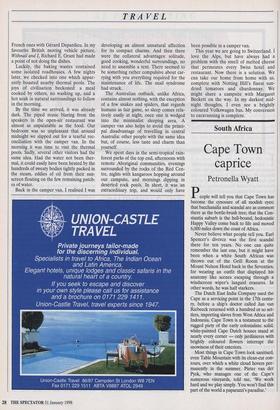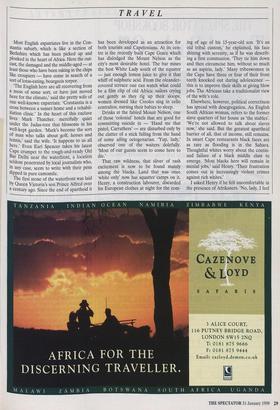South Africa
Cape Town caprice
Petronella Wyatt
People will tell you that Cape Town has become the cynosure of all modish eyes; that bacchanalia and scandal are as common there as the bottle-brush tree; that the Con- stantia suburb is the hell-bound, hedonistic Happy Valley come back to life and moved 6,000 miles down the coast of Africa.
Never believe what people tell you. Earl Spencer's divorce was the first scandal there for ten years. No one can quite remember the last one, but it might have been when a white South African was thrown out of the Grill Room at the Mount Nelson Hotel back in the Seventies, for wearing an outfit that displayed his anatomy like scenes escaping through a windscreen wiper's languid erasures. In other words, he was half starkers.
The Dutch East India Company used the Cape as a servicing point in the 17th centu- ry, before a ship's doctor called Jan van Riebeeck returned with a hundred or so set- tlers, importing slaves from West Africa and Indonesia. Cape Town is a testament to the rugged piety of the early colonialists: solid, white-painted Cape Dutch houses stand at nearly every corner — only jardinieres with brightly coloured flowers interrupt the snowiness of their exteriors.
Most things in Cape Town look sanitised, even Table Mountain with its clean-cut con- tours, over which a white cloud hovers per- manently in the summer. Pieter van der Pyck, who manages one of the Cape's numerous vineyards, told me, 'We work hard and we play simply. You won't find this part of the world a paparazzi's paradise.'
TRAVEL
Most English expatriates live in the Con- stantia suburb, which is like a section of Berkshire which has been picked up and plonked in the heart of Africa. Here the out- cast, the damaged and the middle-aged — at least those who have been raking in the chips like croupiers — have come in search of a sort of lotus-eating, bourgeois torpor. 'The English here are all recovering from mess of some sort, or have just moved here for the climate,' said the pretty wife of One well-known expatriate. 'Constantia is a cross between a sunset home and a rehabil- itation clinic.' In the heart of this enclave lives Mark Thatcher, mercifully quiet under the Judas-tree that blossoms in his well-kept garden. 'Mark's become the sort of man who talks about golf, horses and tennis,' said the wife. 'It happens to us all here.' Even Earl Spencer takes his latest Cape crumpet to the rough-and-ready Old Bar Delhi near the waterfront, a location seldom penetrated by local journalists who, in any case, seem to write with their pens dipped in pure camomile. The first stone of the waterfront was laid by Queen Victoria's son Prince Alfred over a century ago. Since the end of apartheid it has been developed as an attraction for both tourists and Capetonians. At its cen- tre is the recently built Cape Grace which has dislodged the Mount Nelson as the city's most desirable hotel. The bar mixes the best White Lady south of the equator — just enough lemon juice to give it that whiff of sulphuric acid. From the oleander- covered terrace one can watch what could be a film clip of old Africa: sailors crying out gently as they rig up their sloops; women dressed like Creoles sing in cello contraltos, nursing their babies to sleep.
Drinks at the fabled Mount Nelson, one of those 'colonial' hotels that are good for committing suicide in — 'Hand me that pistol, Carruthers' — are disturbed only by the clatter of a stick falling from the hand of some ailing octogenarian. 'Yup, lady,' observed one of the waiters dolefully. 'Most of our guests seem to come here to die.'
That raw wildness, that sliver of rash excitement is now to be found mainly among the blacks. Land that was once 'white only' now has squatter camps on it. Henry, a construction labourer, discarded his European clothes at night for the com- ing of age of his 15-year-old son. 'It's an old tribal custom,' he explained, his face shining with serenity, as if he was describ- ing a first communion. 'They tie him down and then circumcise him, without so much as an aspirin, lady.' Many tribeswomen in the Cape have three or four of their front teeth knocked out during adolescence — this is to improve their skills at giving blow jobs. The Africans take a traditionalist view of the wife's role.
Elsewhere, however, political correctness has spread with desegregation. An English South African woman, refers to the former slave quarters of her house as 'the stables'. 'We're not allowed to talk about slaves now,' she said. But the greatest apartheid barrier of all, that of income, still remains. In smart Cape restaurants black faces are as rare as flooding is in the Sahara. Thoughtful whites worry about the contin- ued failure of a black middle class to emerge. 'Most blacks here will remain in menial jobs,' said Henry. 'Their frustration comes out in increasingly violent crimes against rich whites.'
I asked Henry if he felt uncomfortable in the presence of Afrikaners. 'No, lady, I feel
TRAVEL
much worse in the presence of the English. At least the Afrikaners came here to live. They love this country. You English just use Africa to make money.'
Contrary to liberal legend, most Afrikaners are gentle, tea-tepid and polite to the point of excess. There is no sexual harassment in Cape Town. The Afrikan- ers work too hard and the English are too lazy or too old. The biggest bang you get here is when they fire the noonday gun. Still, at dusk the calm ocean gleams beneath the African moon which comes up in chastened loveliness, like a bride emerging from her chamber. Oh, and it hardly ever rains.
South African Airways. Reservations: 0171 312 5000. Cazenove and Loyd Safaris, 116 Putney Bridge Road, London SW15.




































































 Previous page
Previous page